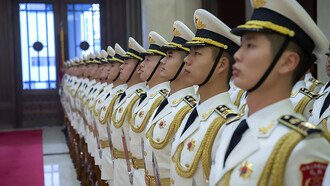Neighbouring the Red Sea in the Arabian Peninsula, the Kingdom of Saudi Arabia (KSA) persistently evokes much controversy and indignation from the international community, particularly with the firmly established norms of human rights principles as applied on the global stage. Its general conduct and governmental dictates are often condemned as despotic, authoritarian, and alarmingly ill-aligned with contemporary international legal standards and customary law. Its blatant legal disregard for the freedom of expression and opinion, women’s rights, religious freedom, and LGBTIQA+ rights, have led to countless human rights groups, international organisations, and nations around the world calling for meaningful change within the KSA’s legal order. However, in recent years, much attention has shifted toward the KSA’s brutal and arbitrary application of capital punishment.
The theocratic monarchical legal order of the KSA is informed by the Basic Law of Governance (BLG), which was issued via royal decree by King Fahd Bin Abdulaziz Al-Saud in 1992. According to Article 7 of its provisions, the decree explicitly declares The Holy Quran and Sunnah (Holy Traditions) as its kingdom’s grundnorm and constitution, to which every law, governmental action, and behaviour abides. Furthermore, as contained in Article 8 of the BLG, the primary source of governance and legislation is the Islamic Sharia, which is applied in both criminal and civil proceedings as the cornerstone of justice within the KSA’s judicial system. Therefore, it should not come as a surprise that the norms of the KSA, a country where religious power and law still subsist in local government and the judicial branches, would be in fundamental disaccord with secularised international law and the enlightenment-era principles that largely form its jurisprudential base.
The KSA’s relationship with international human rights has left a lot to be desired since its refusal to sign the Universal Declaration of Human Rights of 1948, on the basis that its principles conflicted with those found in Islamic Sharia. Since then, according to the United Nations Treaty Body Database, the KSA has ratified various human rights treaties, which include the Convention on the Elimination of All Forms of Discrimination against Women, the Convention on the Rights of the Child, and the International Convention on the Elimination of All Forms of Racial Discrimination, among others.1
Despite the ostensible progress in ratifying these international treaties, the KSA remains under the close watch of human rights groups as enemy number one as it relates to the consistent failed application of human rights principles they are both expressly and tacitly obliged to uphold. As such, the KSA exists today as a country with a legal order based on proclaimed divine authority that is absent of any viable, narrowly defined, or precedential framework that is characteristic of an established, transparent, and functioning legal system. Its current state coupled with the express implementation of the death penalty for various crimes, both serious and objectively arbitrary, has demonstratively led to the deaths of those exercising basic human rights, disregard for the foundational practices of fair due process, and even the inexcusable utilisation of the death penalty against children.
To demonstrate the legislative inadequacies within the KSA’s legal order, one would not have to look further than the crime and penalty classifications found in the Islamic Sharia and the undetermined applicative guidelines accompanying them. Three key classifications are often highlighted. These crimes and punishments are those relating to Qisas crimes, Hudud crimes, and Ta’zir crimes. Qisas crimes include offences such as murder, manslaughter, and battery. The punishments that supplement these crimes follow the principle of an “eye for an eye”, which essentially allows the family of a victim to expressly request the defendant be executed, opt for financial compensation instead (diyat), or pardon the defendant and abstain from requesting a retributive sentence altogether.2
Hudud crimes, considered the most severe under Islamic Sharia, are “claims against God” and encompass crimes such as adultery, apostasy and unlawful warfare/terrorism. All three of them, carry the mandatory punishment of death with little to no opportunity to appeal, as the punishments themselves have been set by divine authority and cannot be questioned.3
Ta’zir crimes are those which do not fall within the ambits of Qisas or Hudud, and are not prescribed a specific punishment by the Quran itself. This dangerously vague category encompasses crimes such as attempted adultery, fortune telling/sorcery, or the refusal of a wife to follow her husband's orders. Since there are no express punishments for these crimes, the broad discretion given to judges in these circumstances determines the punishment handed out based on the BLG and/or manuals from various schools of religious thought, which also includes death.4
All three of these categories, as applied in the KSA, expressly violate international legal standards across the board. Unrelated to capital punishment itself, these categories of crimes and their prescribed punishments violate international human rights standards on cruel, inhuman, and degrading punishment (i.e concerning flogging, amputation, and stoning as forms of penal sanction), privacy laws as it relates to the proscribed crime of fornication, the right to religious freedom as it relates to the crime of apostasy, among others.5 With capital punishment, however, the KSA’s implementation of the death penalty does not meet the important international human rights standard of the “most serious crimes”.
According to the United Nations Human Rights Committee, concerning the right not to be arbitrarily deprived of one’s life as contained in Article 6 of the International Covenant on Civil and Political Rights of 1976 (ICCPR), the death penalty may only be narrowly imposed as it relates to crimes of “extreme gravity” that involve “intentional killing”.6 Therefore, implementing the death penalty for crimes such as adultery, apostasy, and committing homosexual acts cannot be carried out. However, this may be a moot point, as the KSA is not bound by the provisions of the ICCPR, having never ratified the document. Although, the KSA has ratified the Arab Charter on Human Rights of 2004 (Arab Charter), which explicitly adopts the “most serious crimes” limitation into its Article 6 prohibition on the death penalty.7 Unfortunately, there exists no mechanism of accountability and enforcement with the charter. Additionally, the current push to establish an Arab Court of Human Rights has been recurrently stalled due to lack of support from state parties, and procedural inadequacies that hinder its formal institution.8
The arbitrary suffering caused by the KSA’s absence from the ICCPR’s listed state party signatories and explicit failure to uphold the provisions of the Arab Charter has generated much investigation by numerous international human rights organisations. One such investigation has statistically documented the KSA’s implementation of the death penalty in a 2023 report by the non-profit organisation Reprieve and the European Saudi Organisation for Human Rights. According to the report, an alarming 1243 people were executed in the KSA between 2010 and 2021, with 43% of those executions utilised for non-lethal crimes, such as adultery, drug offences and state security offences, among others.9 Therefore, the report asserts that almost half of the executions between 2010 and 2021 did not meet the “most serious crimes” limitation, ultimately resulting in 542 violations of the right to life. Furthermore, 94% (513) of those executions for non-lethal offenses were undertaken for crimes for which there was no statutory codification, thereby resulting from often broad discretionary sentencing. Executions resulting from discretionary sentencing amounted to 47% of the total 1243 executions that occurred within the 11 years examined by the report. The KSA saw its bloodiest period in the previous 6 years under the rule of King Salman bin Abdulaziz Al Saud and Crown Prince Mohammed bin Salman Al Saud, with a staggering average of 129.5 executions per year between 2015 and 2022. This accounted for an 82% increase in the average executions per year from its previous average of 70.8 executions per year between 2010 and 2014.
The most egregious statistical reality documented by the report is the KSA’s continued use of the death penalty against children. Despite the KSA’s institution of the Juvenile Law of 2018 and a subsequent 2020 Royal Decree expanding the provisions of the Juvenile Law, which as a duo ostensibly prohibits the execution of children, a likely under-represented number of 15 child defendants have been executed since 2010. The articles of the Convention on the Rights of the Child also seem to have little bearing on the KSA’s ongoing efforts to blatantly violate its children's lives, innocence, and dignity. An important document, which explicitly prohibits the implementation of capital punishment on those below the age of 18.10 This is primarily due to the substantive inadequacy of the previously mentioned reformatory statutes that limit the prohibition to crimes resulting from discretionary sentences only. Therefore, the crimes of Hudud and Qisas still carry mandatory death sentences for children. However, according to the report, 7 discretionary death sentences of children still occurred after the promulgation of the 2018 Juvenile Law.
One such case was the execution of Mustafa Hashem al Darwish in June of 2021. Mustafa was arrested in 2015 for allegedly “participating in armed rebellion” and “sowing discord”, during riots that took place in the Eastern Province of the KSA between 2011 and 2012.11 Mustafa was 17 at the time of his alleged crime. Mustafa was then held incommunicado for six months in solitary confinement without access to any representative council. It was only at the very beginning of his trial two years later that Mustafa was allowed access to a lawyer, which was in direct violation of basic fair trial practices. Mustafa’s eventual confession, which the Specialised Criminal Court ultimately used as the basis for his death sentence, was reportedly acquired through torture. Despite these massive discrepancies, Mustafa was sentenced to death on a discretionary sentence for a Ta’zir crime. His family has not seen his body returned nor were they informed of his execution at the time, only having found out about his execution on the local news.12 Mustafa has been a single instance of one too many cases of child execution in the KSA, and a wake-up call to the international legal order. The KSA is a prime example of an old-age manner of government whose authoritarian power subsists only due to insufficient international legal pressure and condemnation.
The execution of 81 people in a single day seems like an event that one should only read about in history books with a modern sense of accomplishment that we as a global community have evolved to collectively invalidate. Yet, such an event did occur, only 2 years ago on the 12th of March 2021 in the KSA. The wholesale use of capital punishment, tortured confessions, old-age theocratic penal frameworks, child executions, and secretive systems of judicial application are all characteristic of Saudi Arabia’s kingdom of bloody retribution.
A greater collective effort to legally condemn and sanction the KSA for breaches of basic human rights as it relates to their implementation of the death penalty is severely needed. Inversely, collective effort to legally support and encourage positive change within the KSA’s legal order is also greatly needed to expedite a meaningful evolution of the KSA’s legal framework and wipe clean the bloodstains of the continued arbitrary deprivation of life within the country.
References
1 OHCHR ‘United Nations Treat Body Database: Ratification Status for Saudi Arabia’.
2 Penal Reform International ‘Sharia law and the death penalty: Would abolition of the death penalty be unfaithful to the message of Islam?’ July 2015.
3 Wardi F ‘Fiqh Al-Jinayat in Solving Crimes Committed by Underage Children’ (2021) 9 Malaysian Journal of Syariah and Law 30-38.
4 Munir M ‘The Principle of Legality in Islamic Criminal Justice System’ (2015) 7 Hazara Islamicus 107-120.
5 Ismail SM‘The Dilemma of Hudud and International Human Rights: Proposing a Benevolent Mechanism’ January 2007.
6 UNHRC‘General comment No.36:Article 6:right to life’CCPR/C/GC/36(3 September 2019).
7 Article 6 of theArab Charter on Human Rights 2004, [ST/HR/]CHR/NONE/2004/40/Rev.1.
8 Almutawa A ‘The Arab Court of Human Rights and the Enforcement of the Arab Charter on Human Rights’ (2021) 21 Human Rights Law Review 506-532.
9 Reprieve ‘Bloodshed and Lies: Mohammed bin Salman’s Kingdom of Executions’ January 2023.
10 Article 37 of the Convention on the Rights of the Child, 20 November 1989, United Nations, Treaty Series, vol. 1577.
11 Aljazeera ‘Mustafa al-Darwish: Saudi Arabia executes man over teen protests’ 16 June 2021.
12 Amnesty International UK Saudi Arabia: 26-year-old facing execution for 'rioting' after forced confession 8 June 2021.















